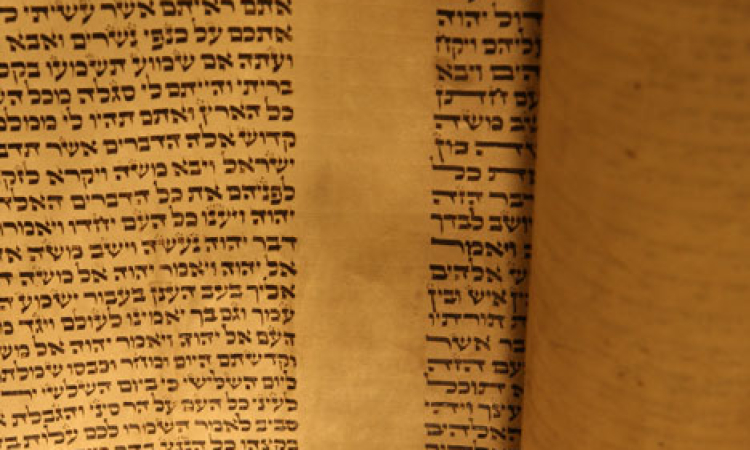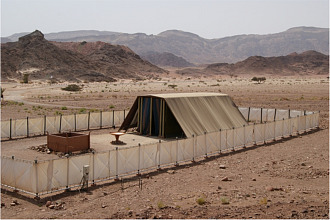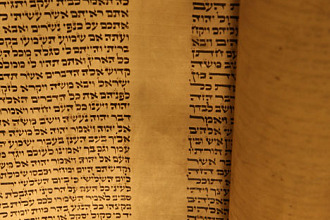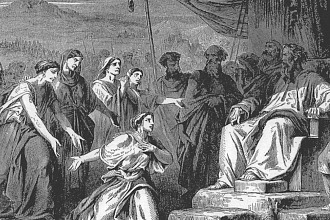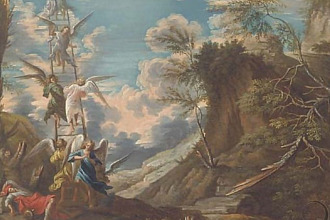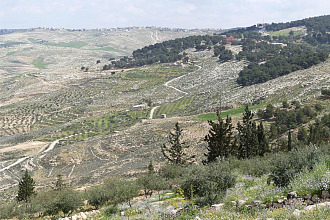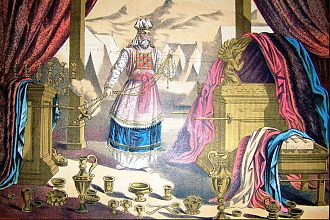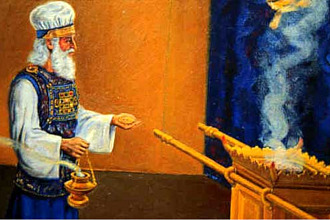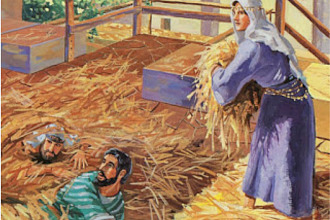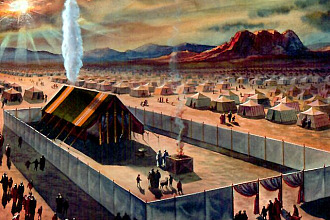Parasha for the Week: Shoftim Deuteronomy 16:18 – 21:9
Haftara for the Week: Isaiah 51:12 – 52:12
Besot Yeshua: Mark 6:53 – 7:8
Overview:
Moshe tells Israel to appoint judges and officers in their cities. A bribe of even an insignificant sum is forbidden.
Trees are not to be planted near Hashem’s altar, as was the way of idolaters.
Blemishes in animals designated for offerings and other points of disqualification are listed.
The Sanhedrin is to make binding decisions on new situations according to Torah criteria.
Any one who refuses to accept the decisions and laws of the Sanhedrin incurs the death penalty.
A Jewish king may only have possessions and symbols of power commensurate with the honor of his office, but not for self-aggrandizement. He is to write for himself two sifrei Torah, one to be kept with him wherever he goes, so that he doesn’t become haughty.
Neither the kohanim nor the levites are to inherit land in the land of Israel, rather they are to be supported by the community by a system of tithes.
All divination is prohibited.
Hashem promises the Jewish people that He will send them prophets to guide them, and Moshe explains how a genuine prophet may be distinguished from a false one.
Cities of refuge are to be provided an accidental killer to escape the blood-avenger from the deceased’s family. However, someone who kills with malice is to be handed over to the blood-avenger.
Moshe cautions the children of Israel not to move boundary markers to increase their property.
Two witnesses who conspire to “frame” a third party are to be punished with the very same punishment that they conspired to bring upon the innocent party.
A kohen is to be anointed specifically for when Israel goes to war, to instill trust in Hashem.
Among those disqualified from going to war is anyone who has built a new house but not lived in it yet, or anyone who is fearful or fainthearted. An enemy must be given the chance to make peace, but if they refuse, all the males are to be killed.
Fruit trees are to be preserved and not cut down during the siege. If a corpse is found between cities, the elders of the nearest city must take a heifer, slaughter it, and wash their hands over it, saying that they are not guilty of the death.
"Shoftim: Parashat’s Title"
This week’s parasha, Shoftim, begins with the mitzvah of appointing shoftim (judges) and officers (police) to ensure a just and honest judicial system. “You shall appoint judges and officials (police) throughout your tribes, in all your gates that the L-rd your G-d is giving you” (Deut. 16:18).
"Justice and Tzedakah"
The Torah commands Tzedek: “Justice, and only justice, you shall follow, that you may live and inherit the land that the L-rd your G-d is giving you.” (Deuteronomy 16:20). Although “Justice, Tzedek, you shall pursue” is an instruction to judges to pass “righteous” judgment, it can also refer to the concept of “charity” –Tzedakah– which also comes from the word Tzedek. In this context, the Torah commands every believer to pursue the mitzvah of giving charity “so that you may live and inherit the land.”
"Judge Yourself First"
The Torah states, “Judges and officers you shall appoint for you,” (Deut. 16:18). According to our sages, this also has another message. It implies that before a person judges others, they must first judge themselves.
This applies equally to an individual who might be judging others or to a judge passing judgment upon others. They must remember to judge themselves and live by the same standard they would impose on others. Then, and only then, can they “judge the people with righteous judgment.”
This is also in accordance with the following directives of our Talmudic sages: “A person should correct their own faults before correcting others.” Only then will one be able to properly influence the behavior of others. Our sages also say: “Do not judge others until you have put yourself in their place.”
HAFTARA Isaiah 51:12 – 52:12
In this Haftarah portion, God continues to comfort Yisrael and answers Isaiah’s unspoken cry of distress. In verse 12 the use of the pronoun “you” means that God addresses this word directly to the prophet who is feeling fearful: “I, [only] I am the One who comforts you. Who are you that you should fear man, who dies, or a son of man, who is given up like grass?” (Isaiah 51:12). Who are you to be afraid of man? I am with you! is the response of God to the frightened prophet. The prophet is invited to put his faith and trust in Hashem: “But you forgot Hashem your Maker” (51:13a).
Isaiah 51 shows that Hashem is aware of the situation of His people and of each one of us. Is the oppressor more powerful than the One who made the heavens and the earth? “who stretched out the heavens and laid the foundations of the earth. Are you in constant dread all day because of the fury of the oppressor as he makes ready to destroy? But where is the fury of the oppressor?” (51:13b). According to Radak, this oppressor is Sennacherib, king of the Assyrians. This oppressor will disappear, and Hashem will deliver the one who is oppressed: “Soon one bowed down will be released. He will not die and go to the Pit, nor will his bread be lacking.” (51:14).
What God’s people need is trust in Hashem, the One who has the power to deliver them from anyone and from Exile: “For I am Hashem your God, who stirs up the sea so that its waves roar—Hashem-Tzva’ot is His Name.” (51:15). Hashem is in control of everything, even nature, and He is the Lord of the army of heaven. He has the power to stir up the nations who oppress Judah and to deliver Judah from any exile. Hashem continues to love His people and reminds them of what He has done for them in the past: “I have put My words in your mouth, and covered you with the shadow of My hand—I who set the heavens in place, who laid the foundations of the earth, and say to Zion, ‘You are My people.’” (51:16). It is very possible that here God speaks directly to the prophet: “I have put My words in your mouth.” Isaiah has a mission to fulfill, and as long as this mission is not finished God is protecting him: I “covered you with the shadow of My hand.” This mission is not only given to the prophet, but also to His people, here called, “Zion,” to whom God says: “You are My people.” His people are to proclaim and to witness about the greatness of their God, Hashem. It is also clear that this “word in your mouth” is an invitation to study His word, for without studying there is no possibility to share it properly.
At the end of this Haftarah comes a beautiful text about proclamation: “How beautiful on the mountains are the feet of him who brings good news, who announces shalom, who brings good news of happiness, who announces salvation, who says to Zion, ‘Your God reigns!’” (52:7). Jewish tradition has seen in this verse the “beautiful feet” of the one who announces the coming of the Messiah, meaning Elijah. But this messenger announces much more than just the coming of Messiah. This includes: 1) the Good News, which has been translated in the Greek as “Gospel” or the Besorah; 2) Shalom, that is peace with God and with his fellow man, and only this peace will bring “happiness”; 3) Salvation to the people of God who will then reign in the kingdom of God. These three aspects of the future redemption are all applied to the Messiah Himself who brings the Good News (Gospel) of Shalom, happiness and salvation.
Besorat Yeshua: Luke 21:5 - 28
In our parasha we discover that it is more important to follow God’s commandments than the various traditions established by the Sages of Yisrael. (Deuteronomy 19:9).
In this week’s Besorah, Yeshua shows his talmidim how easy it is to deviate from God’s law even though we think we are on a good spiritual path. Yeshua confirms what Moshe said and insists the commandments are more important than the traditions. Yisrael must follow the commandments of God as a higher priority than following the traditions: “You have a fine way of setting aside the commands of God in order to observe your own traditions” (Mark 7:9). While Yisrael doesn’t reject the law of God, in their goal of achieving perfection they add many traditions which are intended to become barriers against breaking the law of God. While the law of God says: “Do not boil a kid in its mother’s milk” (Exodus 23:19), the Sages, in order to help Jews not to transgress the commandment, added, “Don’t boil any meat with milk” and then “Don’t cut meat with the knife you use to cut butter or cheese” then “Don’t eat meat on the same plate that has ever touched milk foods” and then “Don’t wash your ‘meat’ dishes or cooking utensils in the same sink used to wash your ‘milk’ dishes or cooking utensils” etc. etc… It is good to try to help our people not to transgress God’s laws, but we have to be careful not to put extreme and unnecessary burdens on the shoulders of God’s people. While we say it is good to help God’s people, we find Yeshua did something similar as the Sages of Yisrael: he added to the commandments of God. We recall what Yeshua taught in the Sermon on the Mount he quoted one of the Ten Commandments, saying: “You have heard it was said to those of old, ‘You shall not murder, and whoever commits murder shall be subject to judgment’” (5:21). Then immediately afterward he added something that is not in the Torah of the Tanach: “But I tell you that everyone who is angry with his brother shall be subject to judgment. And whoever says to his brother, ‘Raca,’ shall be subject to the council; and whoever says, ‘You fool!’ shall be subject to fiery Gehenna.” (5:22). Here Yeshua added to the commandment, “don’t murder,” by teaching “don’t be angry with your brother” and “don’t say Raca.” While these are not written in the Torah. Yeshua knew that before killing someone we have to be upset and angry with them. Yeshua’s “don’t be angry” is a barrier to keep us from breaking God’s law. If I never become angry with my brother, I will never kill him. Thus Yeshua did exactly the same thing as the Pharisees. We see, therefore, that it is not wrong to protect ourselves from breaking God’s law, but the danger is when these traditions, after a few generations, are not seen any more as traditions but are considered as God’s laws and then they ultimately replace the commandments of God.
This is not only a Jewish tendency: each religion has built its own customs, rules, and traditions. Even in our own local kehilah, social circle, or family, in our personal and religious life we have established some rules, what to eat, what not to eat, that from time to time go further than what is written in the Bible, how to keep Shabbat, what to do and what not to do, etc. We have to be careful not to impose these local or personal traditions on others as if they are God’s laws from His Word. We must not replace the Torah by these traditions to the point that they become more important than God’s commandments. Yeshua gives an example of this trap: “For Moshe said, ‘Honor your father and your mother,’ and, ‘Anyone who curses his father or mother must be put to death.’ But you say that if a man says to his father or mother: ‘Whatever help you might otherwise have received from me is Corban’ (that is, a gift devoted to God), then you no longer let him do anything for his father or mother” (Mark 7:10-12). We notice in this example that the motivation is a religious one. Religious leaders never deliberately say, “Let’s change the law of God.” Most of the time they have good intentions, but the result is not good because they are imposing their own rules and traditions on the entire people of God, putting their traditions above God’s law. A good example of this principle in Christianity is the change of Shabbat to Sunday. Keeping Sunday comes from a nice tradition at the beginning (to honor the resurrection of Yeshua), but after a few generations it became more important than the 4th commandment which says that the seventh-day Shabbat is the day of rest. And in the 4th century, Constantine the Roman emperor, under the influence of the Roman church leaders, decided to impose this tradition on everyone, requiring everyone to keep Sunday as the day of rest and punishing anyone who wanted to continue to keep the original Shabbat of the Bible.
Another parallel between the parasha and Besorah, is that the parasha speaks about establishing judges who will give justice, emphasizing the importance of righteousness and justice: “Righteousness, righteousness shall you pursue, so that you will live and possess the Land that the Almighty your God gives you” (Deuteronomy 16:20). In the Besorah, Yeshua knows that righteousness and justice should come from the heart of man, something that happens only in hearts that have been cleansed by God: “Nothing outside a man can make him ‘unclean’ by going into him. Rather, it is what comes out of a man that makes him ‘unclean.’” (Mark 7:15-16). Yeshua’s talmidim did not understand this saying of Yeshua, and he exclaimed: “Then, are you also without understanding? Do you not see that whatever goes into a person from outside cannot defile him?” (7:18).
To conclude this portion of the Besorah, Yeshua states a most important principle for our lives, for religion is not only spirituality but also includes our daily actions: “And he said, ‘What comes out of a person is what defiles him. For from within, out of the heart of man, come evil thoughts, sexual immorality, theft, murder, adultery, coveting, wickedness, deceit, sensuality, envy, slander, pride, foolishness. All these evil things come from within, and they defile a person.’” (Mark 7:20-23). How many people give the appearance of spirituality and religiosity, but in fact in their hearts they are worse than murderers.

